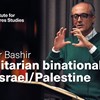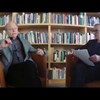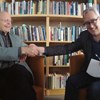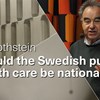nationality
Artificial Intelligence, Datafication and Exploring the Minimum Content of Nationality
The Statelessness & Citizenship Review, 6(1), 124-129 COMMENTARY: Introduction Identifying the minimum content of nationality (‘MCN’), the inalienable core elements or conditions of citizenship witho

Liberal nationalism
David Miller, Gina Gustavsson and Yael Tamir, discusses with Philippe van Parijs and moderator Lars Anell. Gustaf Arrhenius and Bengt Westerberg introduce the subject.

Bashir Bashir: Egalitarian bi-nationalism for Israel/Palestine
Research seminar with Bashir Bashir, associate professor of political theory at the Open University of Israel and a senior research fellow at the Van Leer Jerusalem Institute. This talk argues that eg

Liberal Nationalism - What is it? Why do we need it? Gustaf Arrhenius and David Miller
Liberalism and nationalism are in many ways contradictory positions. The ideals of open borders, free movement of people, goods and services, cosmopolitanism and internationalism that are associated w

Liberal Nationalism - What is it? Why do we need it? Gustaf Arrhenius and David Miller
Liberalism and nationalism are in many ways contradictory positions. The ideals of open borders, free movement of people, goods and services, cosmopolitanism and internationalism that are associated w
Poor Kids? Economic Resources and Adverse Peer Relations in a Nationally Representative Sample of Swedish Adolescents
Journal of Youth and Adolescence, First online, DOI 10.1007/s10964-017-0747-8 Abstract There is limited knowledge on the impact of economic resources on adverse peer relations during adolescence. This st
Liberal Nationalism - David Miller, Gina Gustavsson, Yael Tamir, Philippe van Parijs
Registration: The seminar is free of charge but you need to register: Click here The seminar will be held in English Several studies show that citizens in North America and Europe have strong emotional ti These questions are the focus of two new books: Liberal Nationalism and Its Critics, and Why Nationalism. We have the great honor to bring together the authors of these books on February 5: David Miller, Gina Gustavsson and Yael Tamir. They will together with political philosopher Philippe van Parijs discuss these topics. The evening is moderated by Lars Anell (Frisinnade klubben, former chairman at Swedish Research Council). Gustaf Arrhenius (Professor of Philosophy and Director at the Institute for Futures Studies) and Bengt Westerberg (Frisinnade klubben, former party leader of the Liberal People's Party) says welcome. : Professor of political theory, Oxford University. The one person most associated with the term “Liberal Nationalism”. Recently published Liberal Nationalism and Its Critics with Gina Gustavsson. : Associate Professor of political science, Uppsala University and Nuffield College, Oxford University. : PhD in political theory, Oxford University. Wrote the much talked about book Liberal Nationalism in 1993. Recently published the book Why Nationalism. Political philosopher from Belgium, one of the world’s most prominent scholars on Universal Basic Income (UBI).
EU Citizens - Thirty years on. An introduction
Nordisk Socialrättslig Tidskrift/Nordic Social Law Journal 38.2024 Patricia Mindus & Anna-Sara Lind (eds.) Abstract 2023 marked thirty years since European Union citizenship was introduced as the Trea
Rainer Bauböck: Globalization, new technologies and the future of democratic citizenship
Professor of Social and Political Theory, European University Institute. ABSTRACT Liberal democratic citizenship has been shaped by the legacies of Athens (democracy) and Rome (legal rights) but operate between individuals and states. In a Westphalian world, citizenship has both instrumental and identity value. Enhanced opportunities and interests in mobility rights strengthen instrumental interests in multiple citizenship among immigrants, among populations in less developed countries, and among wealthy elites. The latter two trends potentially undermine a genuine link norm and, if they prevail, might replace the Westphalian allocation of citizenship with a global market. New digital technologies create a second challenge to Westphalian citizenship. As has argued, digital identities could provide a global legal persona for all human beings independently of their nationality, and blockchain technologies could enable the formation of non-territorial political communities providing governance services to their members independently of states. Both the instrumental uses of citizenship for geographic mobility and technologies that create substitutes for territorial citizenship are not merely relevant as current trends. They are also advocated and defended normatively as responses to the global injustice of the birthright lottery. I will challenge this idea and argue that liberal democracies should not be conceived as voluntary associations whose membership is freely chosen, but as communities of destiny among people who have been thrown together by history and their circumstances of life. How these foundations of democratic community can be maintained in the context of rising mobility and the digital revolution remains an open question.

Bo Rothstein: Should the Swedish Public Health Care be Nationalized?
Research seminar with Bo Rothstein, who holds the August Röhss Chair in Political Science at University of Gothenburg, a position established by a donation to the university in 1901. His research conc








